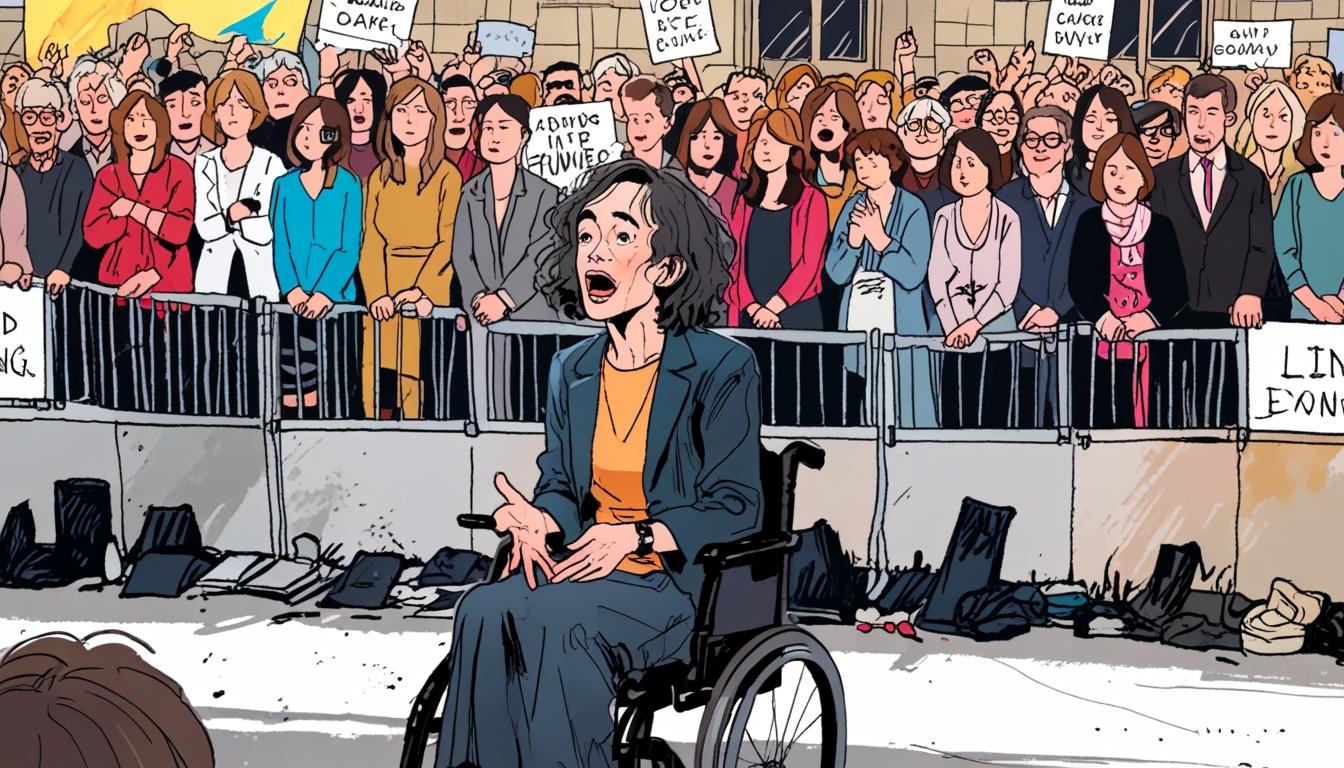In a passionate rally outside the Scottish Parliament, Liz Carr, renowned for her role in the television series Silent Witness, articulated a salient point as the debate over assisted dying legislation intensified. Addressing a gathering of campaigners, she asserted that disabled individuals are not “better off dead” and expressed her exasperation at the persistent misconceptions surrounding the lives of people with disabilities. Carr, who suffers from arthrogryposis multiplex congenita, urged those present to reconsider the societal tendency to view disability as synonymous with suffering.
Her comments arrived on the eve of an important voting session concerning a proposal spearheaded by Liberal Democrat MSP Liam McArthur. The proposed legislation aims to allow terminally ill patients to choose assisted dying, a move that many see as compassionate yet fraught with ethical complexities. "I am so fed up of having to answer strangers' questions," Carr noted in her address, highlighting a prevalent misunderstanding that being disabled implies a life devoid of quality or joy.
Critically, Carr voiced her concerns regarding the bill's definition of terminal illness. She maintained that the language employed is excessively broad, possibly affecting a wide range of individuals living with chronic or progressive conditions — not just those who are terminally ill. This has raised alarms within the disability rights community, which fears that the legislation could unintentionally encourage society to view the lives of disabled individuals as less valuable. The lack of a clear timeframe in the definitions proposed could lead to misinterpretations and misapplications of the law, potentially putting vulnerable populations at risk.
The rally also featured Pam Duncan-Glancy, a Scottish Labour MSP and fellow wheelchair user, who echoed Carr's sentiments. "If any of my colleagues are in any doubt whatsoever, if in doubt: don’t. The risk is too high," she urged the assembled crowd, reinforcing the gravity of the implications such a law might have on the disabled community. Her impassioned plea reflects a recurring theme within this legislative debate: the fear that assisted dying could be seen as a preferable option for those with disabilities, rather than addressing the shortcomings of social care and support systems.
The backdrop to this rally is a burgeoning societal debate about the rights of individuals to make decisions regarding their own lives and deaths. Advocates argue that such legislation offers terminally ill individuals dignity and choice in their final days. McArthur, championing the bill, highlighted the "horrendous decisions and bad deaths faced by dying Scots," declaring that the legislation represents a significant step towards greater choice for terminally ill adults throughout Scotland.
Yet, critics argue that the legislation risks normalising an existential threat to disabled individuals, allowing for the potential devaluation of their lives. Liz Carr emphasised this by stating that the prevailing narrative suggests that a life with disability may be inherently undesirable, a notion that is deeply concerning to those who inhabit these realities daily. The ongoing discussions have sparked widespread debate, underscoring the need for careful consideration and robust dialogue around such a profoundly sensitive issue.
As the bill moves forward to the Health, Social Care and Sport Committee for further scrutiny, it remains crucial for all voices, particularly those of disabled individuals, to be part of the conversation. The ramifications of this legislation extend beyond legal parameters, touching upon ethical concerns and societal values, as the nation grapples with how to balance compassion and care with the rights of its most vulnerable members.
Amidst the divisions, the call for unity and understanding resonates, inviting an essential introspection regarding the societal narratives we construct and the individuals these stories impact the most.
Reference Map
- Paragraphs 1, 2, 3, 4, 6, 7
- Paragraphs 2, 4, 6
- Paragraphs 1, 3, 4, 5
- Paragraphs 4, 6
- Paragraphs 5, 6
- Paragraphs 4, 5
- Paragraphs 4, 7
Source: Noah Wire Services
